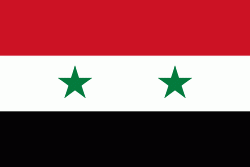Latakia Governorate (Latakia Governorate)
The governorate was historically part of the Alawite State, which existed from 1920–1936.
Tartus governorate was formerly included as part of Latakia, before being split off circa 1972.
The region has been relatively peaceful during the Syrian civil war, being a generally pro-Assad region that had largely remained under government control. The Free Syrian Army attacked Al-Haffah in 2012, and unsuccessfully attempted to wrest control of the province in 2014, 2015 and 2016. In 2016 the Islamic State conducted a bomb attack on Jableh, resulting in many deaths.
Map - Latakia Governorate (Latakia Governorate)
Map
Country - Syria
 |
 |
| Flag of Syria | |
The name "Syria" historically referred to a wider region, broadly synonymous with the Levant, and known in Arabic as al-Sham. The modern state encompasses the sites of several ancient kingdoms and empires, including the Eblan civilization of the 3rd millennium BC. Aleppo and the capital city Damascus are among the oldest continuously inhabited cities in the world. In the Islamic era, Damascus was the seat of the Umayyad Caliphate and a provincial capital of the Mamluk Sultanate in Egypt. The modern Syrian state was established in the mid-20th century after centuries of Ottoman rule. After a period as a French mandate (1923–1946), the newly-created state represented the largest Arab state to emerge from the formerly Ottoman-ruled Syrian provinces. It gained de jure independence as a democratic parliamentary republic on 24 October 1945 when the Republic of Syria became a founding member of the United Nations, an act which legally ended the former French mandate (although French troops did not leave the country until April 1946).
Currency / Language
| ISO | Currency | Symbol | Significant figures |
|---|---|---|---|
| SYP | Syrian pound | £ or لس | 2 |
| ISO | Language |
|---|---|
| AR | Arabic language |
| HY | Armenian language |
| EN | English language |
| FR | French language |
| KU | Kurdish language |
















